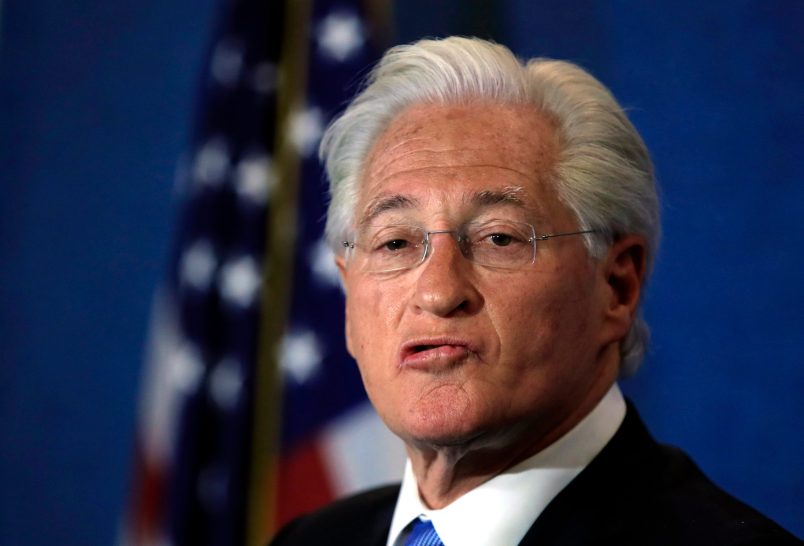We just heard Donald Trump’s personal lawyer, Marc Kasowitz, give his response to James Comey’s testimony. I think it confirms what I wrote yesterday: that President Trump was making a big mistake bringing in his bully lawyer from New York who he uses to ambush business partners and discredit women with accusations to try to handle a big federal investigation. Kasowitz is another version of Michael Cohen, only with a real legal practice. There’s nothing like this kind of investigation. Neither he nor Trump have any experience grappling with anyone like this. It’s not surprising and it may be wise for Trump not to get a DC establishment lawyer. But those folks have experience this Kasowitz quite clearly doesn’t.
There were some things Comey said that were advantageous to the President. He said that during his time at FBI, President Trump himself was never the subject of an investigation. He confirmed President Trump’s claim that Comey assured him three times of that fact.
But Kasowitz did something quite odd. He denied that President Trump had ever asked Comey for his “loyalty”, a dubious denial giving the relative credibility of the two men. But then he doubled down on the proposition that people who work in Trump’s administration very much do owe him loyalty.
Here are his words …
The President also never told Mr. Comey, “I need loyalty, I expect loyalty” in form or substance. Of course, the Office of the President is entitled to expect loyalty from those who are serving in an administration, and, from before this President took office to this day, it is overwhelmingly clear that there have been and continue to be those in government who are actively attempting to undermine this administration with selective and illegal leaks of classified information and privileged communications. Mr. Comey has now admitted that he is one of these leakers.
“Loyalty” can mean a lot of things. And those “serving in an administration” can be interpreted different ways. But this sounds very much like Trump and Kasowitz think that everyone currently serving in the executive branch, including career employees, owes President Trump personal loyalty. That seems to be the only reasonable interpretation. I think Trump does believe that. But that’s not our system.
Next he goes on to accuse Comey of “leaking” what he calls “privileged communications” with President Trump.
Today, Mr. Comey admitted that he unilaterally and surreptitiously made unauthorized disclosures to the press of privileged communications with the President. The leaks of this privileged information began no later than March 2017 when friends of Mr. Comey have stated he disclosed to them the conversations he had with the President during their January 27, 2017 dinner and February 14, 2017 White House meeting. Today, Mr. Comey admitted that he leaked to friends his purported memos of these privileged conversations, one of which he testified was classified. He also testified that immediately after he was terminated he authorized his friends to leak the contents of these memos to the press in order to “prompt the appointment of a special counsel.” Although Mr. Comey testified he only leaked the memos in response to a tweet, the public record reveals that the New York Times was quoting from these memos the day before the referenced tweet, which belies Mr. Comey’s excuse for this unauthorized disclosure of privileged information and appears to entirely retaliatory. We will leave it the appropriate authorities to determine whether this leaks should be investigated along with all those others being investigated.
There’s a lot of misdirection, obfuscation and mean words here. But this sounds like someone trying to make an executive privilege argument without knowing how executive privilege works. Or perhaps it sounds like someone who knows how executive privilege works and is trying to pretend it applies here. There are two ways to interpret Comey’s actions – one that he wanted to retaliate for being fired or two that he believed the DOJ leadership was compromised and sought to release information that would lead to the appointment of a special counsel. (I see no real reason to choose between the explanations.)
I have no doubt that Comey’s political enemies will use this admission to attack his character. But as a legal matter, this isn’t how it works. Comey can tell people what he wants. From the beginning, Trump and his team have conflated leaks which people have every legal right to do (they can also be fired for it) with classified leaks, which are illegal. Trump and Kasowitz come out of a world of pervasive NDAs and attorney-client privilege and want to think that people who work in the executive branch have that kind of obligation to the President Trump. They don’t.
This kind of stuff works if you’re trying to keep the money of people you fleeced at Trump University or intimidate women alleging assault. But this kind of lawyering can get you into a lot of trouble in this kind of investigation.






